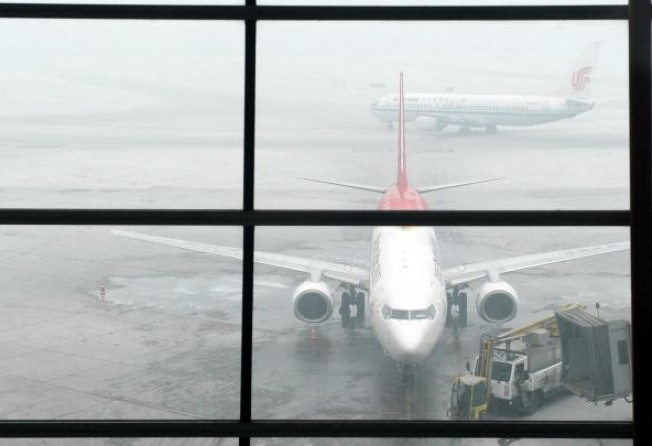
Flights cancelled as Beijing is blighted by smog yet again
Travel chaos at end of holiday after visibility drops below 500 metres, and new study puts the blame on nature and human activities

Thick smog that blanketed Beijing and surrounding regions for a record 21 days last month returned yesterday, causing travel chaos as many businesses reopened and people returned after the Lunar New Year holiday.
Highways were forced to temporarily close and airline traffic was disrupted as visibility near Beijing International Airport fell, delaying some early morning flights, Xinhua reported.
At 7.45am, the Beijing Meteorological Bureau issued a "yellow" fog alert, indicating that visibility in eastern and southern parts of the city would be less than 500 metres in the next three hours, and authorities urged residents to take necessary precautions. The yellow warning was lifted at 11am, and the smog levels had fallen sharply by last night.
Since Saturday evening, moderate to severe air pollution was reported in much of the city, accompanied by high levels of health-threatening PM2.5 pollutants.

In the neighbouring province of Hebei , air quality was also considered "hazardous". Weather authorities started issuing yellow fog and haze alerts across the province on Saturday morning, and two "orange" alerts were issued that night and early yesterday as visibility dropped below 200 metres, according to the bureau's website.
Orange is the second-worst level after "red", which indicates visibility of less than 50 metres.
By 8am yesterday, the air quality index readings maxed out at 500, indicating extreme pollution, at five monitoring sites in Shijiazhuang, the provincial capital, Xinhua reported. Readings from Hebei's air quality monitoring network showed the figure at 426 by 4pm yesterday, and meteorologists said the hazy conditions would persist into the night.
Yellow fog warnings were also issued in Tianjin and Henan province yesterday morning.
As for attributing reasons for smog that has plagued Beijing and surrounding areas this winter, a group of researchers from the Chinese Academy of Sciences claim in a new study that nature and human activities are to blame.
Chen Liangfu, one of the researchers involved in the study, said that when fine particles in the air came into contact with vapour, they could turn into larger particles visible to the eye.
The study said the biggest source of Beijing's air pollution was vehicle emissions, which accounted for a quarter of the pollutants. Coal burning and pollutants from outside Beijing were the other major contributors, according to the China Youth Daily.
Pollution in Beijing rose to a record on January 12, with PM2.5 surging as high as 993, sparking criticism of the government's environmental management. The capital's daily average last month of 196 was similar to that in an airport smoking lounge.
Vice-Premier Li Keqiang called for patience as authorities worked to reduce emissions.
Sales of fireworks in Beijing fell significantly during the Lunar New Year holiday as residents tried to ward off smog.
UPDATE: Sixteen flights were cancelled at Beijing’s Capital International Airport early Monday morning.
At 9.30am (local time) at least a dozen international flights were listed on the BCIA's website as cancelled; nine grounded locally to destinations including Abu Dhabi, Moscow and Warsaw and another four flights which were expected arrivals.
Four of the cancelled flights were domestic, including flights to Hangzhou and Guangzhou, as well as arrivals from Wenzhou and Guangzhou.